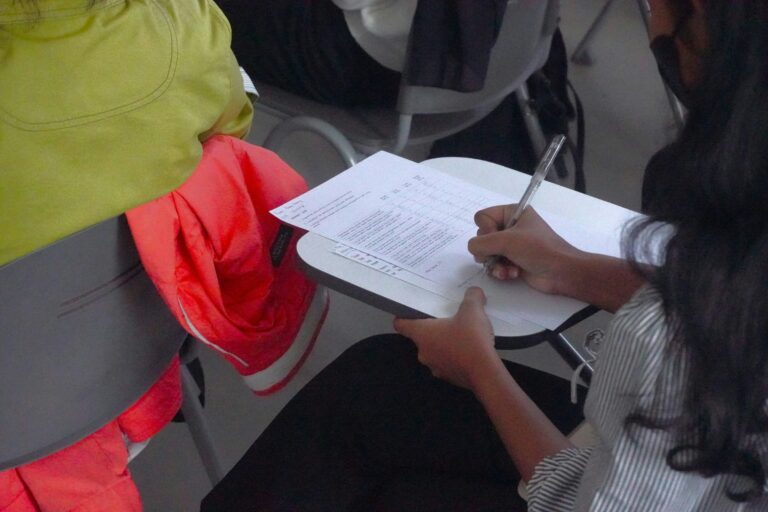IELTS Academic: the complete guide for Candidates
Date of the last update: 22.05.2025
The IELTS (International English Language Testing System) exam is an internationally recognised test that assesses the language competence of those intending to study or work in countries where English is the official language. The Academic version of this exam is particularly dedicated to those who plan to pursue higher education abroad. So, what is IELTS Academic about? What exactly is its structure and what are the best methods to prepare for it? What should you pay particular attention to when studying and what are the differences between it and the IELTS General Training version?
Table of contents:
- Structure of IELTS Academic
- How to effectively prepare for the IELTS Academic exam?
- Strategies to use during the exam
- Summary
You can read this article in 4 minutes.
Structure of IELTS Academic
IELTS Academic consists of four main sections that comprehensively assess different aspects of your language skills:
- Listening – this part lasts 30 minutes and is designed to assess listening comprehension skills in English. It consists of four parts in which participants listen to audio recordings and answer questions related to their content. These recordings can cover a variety of situations, from everyday conversations to specific social situations to academic lectures.
- Reading – this part of the test is intended to take 60 minutes. It consists of three texts of an academic nature, which are characterised by greater complexity and require the test taker’s ability to analyse and understand the context. Participants must answer 40 questions that test their ability to read selectively, understand the text and draw conclusions.
- Writing – this section also lasts 60 minutes and consists of two tasks that assess the ability to express thoughts and arguments in writing. In the first task, participants are asked to describe data presented in the form of a graph, table or diagram. The required length of the statement is a minimum of 150 words. The second task involves writing an essay on a given topic, where the minimum length is 250 words. Essay topics can be very diverse, covering issues related to education, the environment, technology, health, work, culture or family.
- Speaking – this part of the exam lasts between 11 and 14 minutes. It is conducted in the form of a direct interview with the examiner and is divided into three parts. The first part is an introduction of yourself and a general conversation on personal topics. The second part is a longer speech on a specific topic. The third part is a discussion with the examiner on the topic raised in the second part.
How to effectively prepare for the IELTS Academic exam?
Proper preparation for the IELTS exam requires time, regularity and commitment. There are a number of methods that can be adapted to suit individual needs and preferences. Learn 5 effective advices:
- Understanding the exam structure – a thorough understanding of the test format allows for better time management during the exam. Each section has its own specific requirements and question types that are worth familiarising yourself with.
- Regular practice – practice is the key to success. Taking regular mock tests will help you get used to the exam format and improve your time management skills.
- Expanding academic vocabulary – focus on learning the academic vocabulary that is essential for reading and writing tasks.
- Classes with native speakers – attending classes taught by native speakers or using online platforms to learn English can significantly improve speaking and listening skills and increase confidence.
- Analysis of mistakes made – careful analysis of the mistakes made when solving mock tests is crucial. Understanding the reasons for mistakes will help you avoid them in the future. It is also worth taking advantage of individual consultations with experienced tutors who specialise in IELTS preparation.
Strategies to use during the exam
During the exam itself, it is worth remembering a few proven strategies that can help you achieve a better score:
- Listening – focus on the context of the recording and take notes, concentrating on key information.
- Reading – read the questions before you start reading the text so you know what to pay particular attention to. Pay attention to key words and phrases.
- Writing – plan your answers before you start writing. Spend a few minutes sketching out the structure of your essay. Use clear and precise sentences and avoid unnecessary repetition.
- Speaking – speak fluently and clearly. Don’t be afraid to pause to collect your thoughts. Try to develop your answers by adding examples or personal experiences.
Summary
The IELTS Academic exam is an important step for anyone planning to study in an English-speaking country. Proper preparation, regularity and commitment are the keys to success. Be sure to practise all four language skills regularly and become thoroughly familiar with the structure of the exam. By doing so, you will increase your chances of achieving a high score and opening the door to your dream education abroad.








